Last Updated on July 21, 2023 by Rod Olivares

There are times when you really want to have a working television and your generator is the best–or the only–option to power it.
You wouldn’t want to be eager to watch your show only to find that your generator was overloaded!
This post will help you understand generators and televisions and how they work (or don’t work) together.
How Many Watts Does a TV Use?
It can be difficult to say whether a particular television and generator pair will work together because there is so much variety.To answer whether a portable generator can power your TV, you need to know how many watts it consumes, which will depend on the size of the screen, the type of television (LCD, Plasma, etc.), and whether or not it is energy-efficient.
Typically, a television’s wattage will be somewhere from 80 to 350 watts.
My TV uses about 160 watts when watching an average show on Netflix. Its screensaver mode uses a surprising 250 watts to power a bunch of fake fish moving around the screen. It’s an OLED screen. When the screen has mostly black on it, and a number of the LEDs turn off, it’s power drops quite a bit.
- A smaller screen size will always have a lower wattage.
- Plasma TVs take more power than LCDs.
- Energy Star-labeled TVs use around 30% less energy than non-efficient TVs.
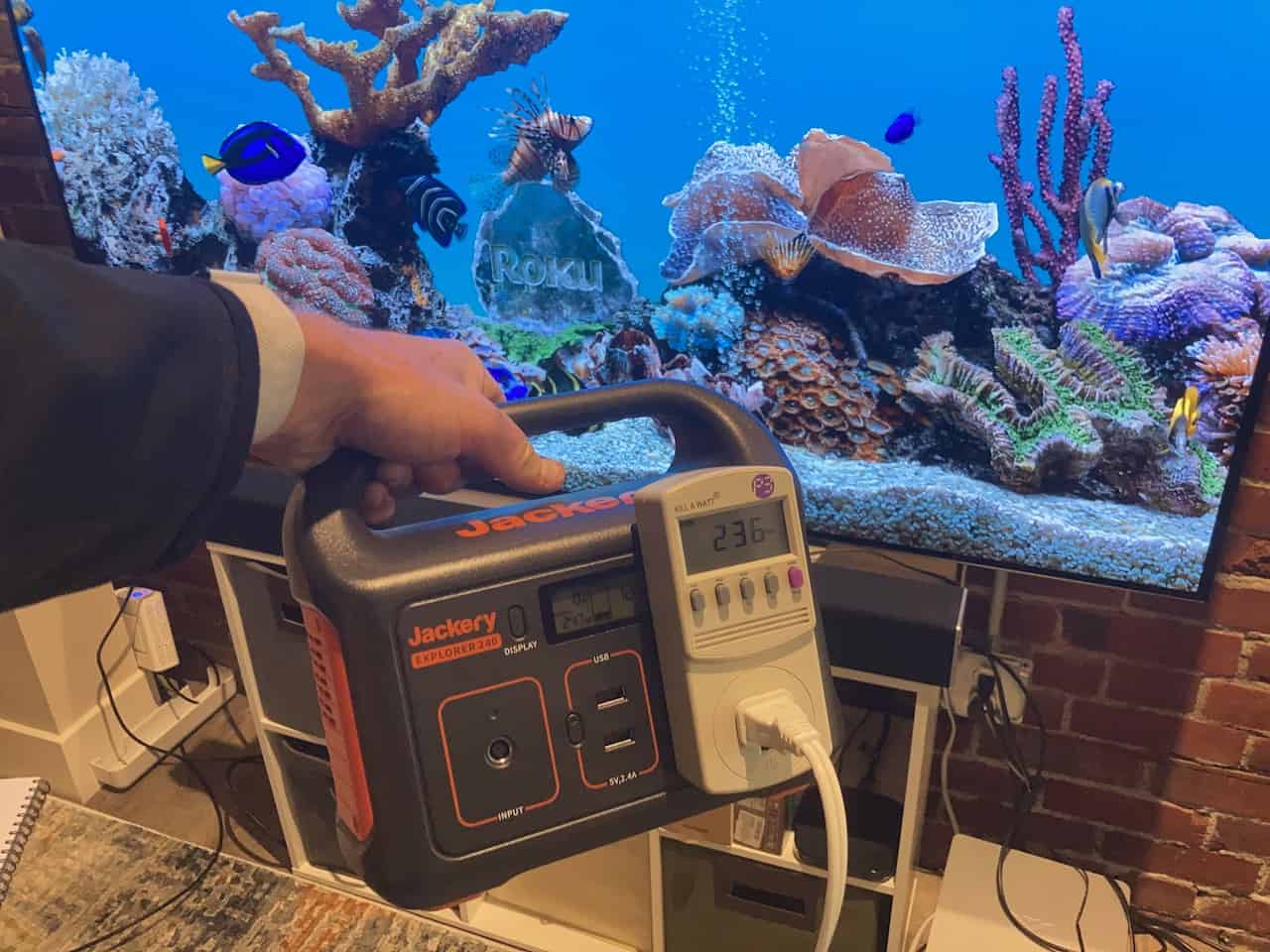
Those are some basic guidelines, but the only way to know how many watts your television consumes is to look it up.
Luckily, this information is easy to find in the TV’s manual, online, or from a retailer.
Can you power a TV with a solar battery generator?
Yes. You can absolutely power a TV with the modern Li-Ion Battery Power Stations. I tested a number of solar battery power stations on my own 65-inch TV, and every battery station great then 240 watts worked like a charm. The Yeti 200x failed, and so I didn’t test below that. But the Jackery 240, 300, 500, & 1000 all powered my TV great. The EcoFlow Delta 1300 of course had no problem at all.
Portable Solar Battery Generators to Power a TV – My Recommendations
Depending on how long you need to power your TV, I would recommend at least a 500W battery generator to power your TV. You could get by with say the Jackery 300, or 240. But then you may only get 1 hour of TV. So, I hope you’re not binging a great show. With a 1,000+ Wh battery like the Jackery Explorer 1000 or the EcoFlow Delta 1300, you’ll be able to get close to watching a whole season of a 30-minute show.
Jackery 1000
Easy to carry, not too heavy, good capacity:
EcoFlow Delta 1300
Highest capacity, a little heavy, charges insanely fast:
Jackery 500
Good budget battery generator pick to power your TV:
Starting Watts vs. Running Watts
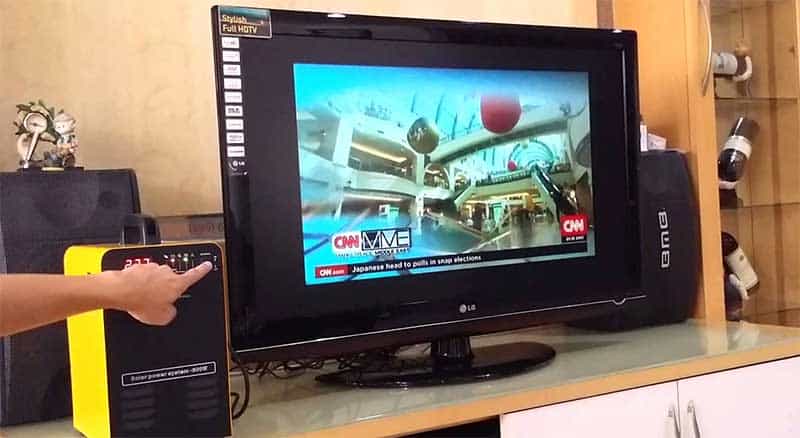
When buying a portable generator, you’ll see discussion of both starting or surge watts and running or rated watts.
Many things, namely tools and appliances with motors, require an extra boost of power when starting up and less continuous power when in use.
For example, your dishwasher would use that extra surge of wattage but your television would not.
You only need to pay attention to the wattage listed for your particular model of television.
As long as this number comes in lower than the running watts the generator is rated for, you shouldn’t have any problems.
Is the TV Sharing the Load?
Since most TVs have a small enough wattage, they will typically be easily powered by even a lower-power portable generator.
However, it’s unlikely that the television is the only thing you’ll be powering.
Always add up the total wattage of everything you have connected to the generator (Click here to check out our total wattage calculator to estimate your needs).
If you don’t do this and you try to power more than the generator can handle, it will overload.
You Need an “Inverter” for Your TV Screen

With electronics, it’s vital that you have an inverter generator.
Inverter technology protects your sensitive electronics by keeping the energy clean and steady.
When the voltage is stable without big fluctuations, your electronics aren’t at risk for serious and permanent damage.
If your generator is not an inverter, it cannot power your TV. Or at least, it would be putting the TV at great risk.
The Noise Factor
Another thing to consider is the noise factor.
Some generators get quite loud, especially when running a heavy load.
You don’t want to have to compete for the television volume with the generator volume.
If you’re running a generator and blasting a television, there’s a good chance you’re going to annoy your neighbors or anyone else nearby.
This is something to consider when you’re buying a generator.
The good news? Portable generators continue to get quieter.
Many great models on the market today are only about as loud as normal conversation (Click here to see our top 10 quietest generators list).
Can a Portable Generator Power Up a TV at a Tailgate Event?
Yes, a portable generator can power up a TV at a tailgate event, but it depends on the wattage requirements of your television set. Before purchasing a portable generator, it is important to consider all the things we’ve discussed in this post and the electrical load that your TV will need to operate. Most televisions require around 120-250 watts, which is a relatively low power requirement. Therefore, a portable generator that outputs 1,000 watts or higher should have enough power to run your TV, as well as other small appliances such as lights, fans, and chargers.
Portable Gas Generators to Power a TV – My Recommendations
Even the smallest portable inverter generators should be able to handle powering a TV.
Since you will likely want to power other things at the same time, though, it’s a good idea to choose a generator with a bit more power, at least 1,600 watts.
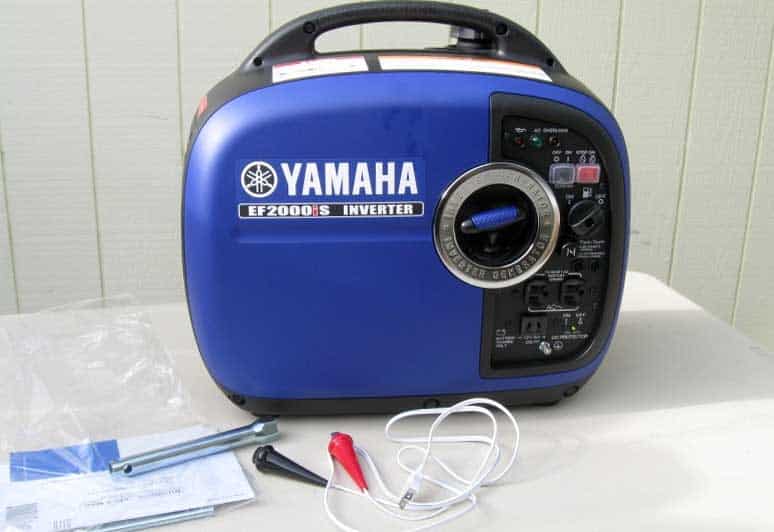
The Yamaha EF2000iSv2 is one good option. It’s rated for 1,600 watts, uses inverter technology, and is known for consistent performance and durability. It’s also extremely quiet.
If your total wattage needs are quite a bit higher, the Briggs & Stratton 30545 P3000 is worth looking at.
It has four AC outlets and is rated for 2,600 watts.
The noise level is a bit higher on this generator, but it will only reach that “too loud to hear the TV” level if you’re operating a max-capacity load with a lot of additional things plugged in as well as the television.
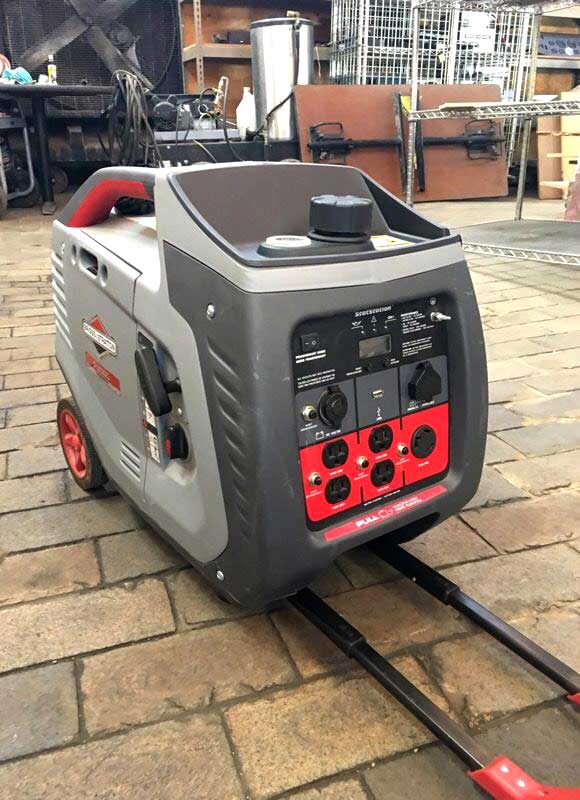
If you want to settle in and watch some movies without having to stop to refuel too often, you might want to look at the Champion Dual Fuel Inverter.
At a 500-watt load (more than enough to cover a television and a DVD player), it will last for nearly 12 hours.
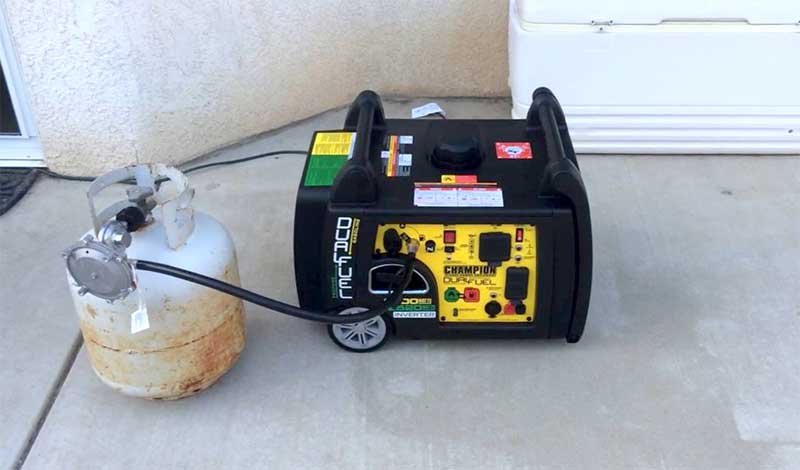
It’s also rated for 3,400 watts, and you can use either gasoline or propane for fuel.
Like the Briggs & Stratton model, this generator has the potential to be fairly loud, but the noise level should still be reasonable.
Wrapping it up
It’s usually possible to power a TV with a portable generator, but it’s important to understand your wattage needs and generator capacity.
In addition to finding out how much wattage your TV requires, you need to take into account the total wattage of everything you are powering.
To safely power your TV with a portable generator, it’s important that the generator is an inverter.
Have you ever powered a TV with a generator? How was the noise factor?
Do you have any questions about generators and TVs that we didn’t cover?
Let us know in the comments.

Scott Krager purchased generatorgrid.com in the summer of 2020 and quickly began to buy every generator under the sun! He currently has over a dozen generators and the number is growing quickly. He lives in Portland, OR near his family and friends.
GeneratorGrid.com is an independent review business. I am not affiliated with any manufacturers and do not accept paid reviews. When you buy through my links, I may earn a commission which helps me purchase more generators for testing. - Scott Krager


Could you comment of what to do for those of us that have a non-inverter generator and a LED TV? Surely there must be many of us in that situation.
Hi Ray, you would need a switched-mode power supply to power it safely, it can be easier to get a new generator..
I’m thinking of using a 400W portable inverter that i initially got for camping. Good move?
When using my TV powered by a Predator 3500 watt quiet generator/inverter in an RV the picture has interference, is there anything I can do??
Hi Steve,
It may be the inverter’s sine wave, I can’t be 100% sure that this is the reason for the interferences but you could try to fix it with this kind of AC power EMI noise filter.
It might also be the generator itself, most use a simple magneto for the sparkplug and normally they don’t use a resistive wire to the plug, so the simplest thing to do is like generatorgrid said use a AC RFI/EMI filter unit and move the generator as far away from the TV / Antenna as you can, also if you know any ham radio operators they could more then likely help you fix this pretty quick, as it’s a common problem for them as well, and the older hams I know love the challange of finding incidental radio freqency emitters.
can I add an inverter to my non inverter generator?
Yes but it’s not simple, the easiest is to use a large computer server power supply to switch the 120 down to 12 volts DC and then a good quility sine wave inverter to step it back upto 120 but it will cost you more in fuel as they are both going to waste power, and by the time you figure out the costs it’s normally cheaper to just get an inverter genset if your really need one. Honestly there is only a few loads that really need an inverter genset.
What are you trying to power ?
Hi,
it may sound a bit stupid, but I would like to have a tv outdoor. The tv is a led 10w and I´m looking to a 500w portable generator with inverter. How many hours can the tv be turned on? I´m looking from 6 to 8hours .
What is the formula you use to calculate time?
thank you!
if the TV uses 10 watts and your genset is 500 watts the TV will stay running until you run out of fuel assuming its a gas unit, but since there is no one making units in gas that size, well not for like the last 30 years or so. I’m guessing genset is a battery unit so you simply divide the watts used by the watt hours of the battery unit so 50 hours, but then there is Peukets Law in the math but to simplify it 45 hours if the batteries are new and about 40 hours if they a older and 8 hours if you forgot to charge it from the last 8 hours of useage.
Hey Matt, I have a gasoline powered generator that powers house through a transfer switch. Is there anything available to clean the power for running the mini splits that would connect at the 30Amp twistlock?
IF YOUR TV STOPS WORKING DUE TO A GENERATOR THEN WHAT NEEDS TO BE REPLACED ON THE TV FOR IT TO BE IN WORKING ORDER?
You only need to replace the magic smoke, once you let that out of the TV it’s very hard to put it back in, really in modern TV’s it might be something simple like a fuse if you can locate them, it’s might be the entire circuit board, and often buying a new TV might be cheaper, some TV’s have modular board so you might get lucky and maybe you can just replace one board, some TV’s only have one board, so without knowing what TV you have it’s really a tough question, and you might have better luck on a TV repair type forum.
If your just asking because your worried the generator might damage your TV, consider getting a cheap used TV, your can find smaller flat screens in places like Value Village / Kijiji / local barging finder/ garage sales for $10 to $20 to see if they work with your generator and doing this at least you won’t be out a +$1000 TV if things go wrong.
I have an electric guitar I play as the only entertainment in my RV. The guitar amp is not too big with an out: @ 10V×2 and need to know if the tailgator from harbor freight 2cycle gas 900 peak watts 2hp engine (63cc)•3600 rpm
output:120 vac can handle it without losing my gerator over
I have a Champion 3500 watt without an inverter. My manual says install a UL1449 surge suppressor to protect electronics. These power strips only cost $15-30. Will a surge protector adequately my LED TV and computer? If not, how common does a generator surge power? I’m thinking I have an old computer anyway so potentially not a big risk to take if a surge is a 1 in 100 occurrance. Thx
Thank you. Your site is clear and informative.